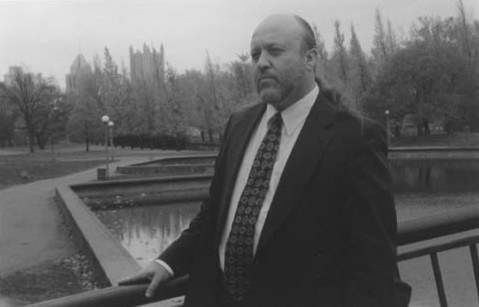Jim McGill
|
Jim McGill Wilkinsburg, Pennsylvania Born August 31, 1951 Borough Council Member, 2nd Ward 7,000 constituents |
Career Overview Elected November 1993 Reelected 1997
|
Jim McGill was a co-founder of the Homophile League of West Virginia University in 1972, which was the first gay/lesbian organization in West Virginia.
News article about Jim McGill
McGill: Glove faux pas Political
by Monica L. Haynes
Pittsburgh Post-Gazette, June 29, 1995
As one of 50 gay or lesbian elected officials visiting the White House recently, Wilkinsburg Councilman Jim McGill saw the Secret Service agents donning blue rubber gloves to process the delegation through a security check point. He just couldn’t believe that they could be wearing them for the reason he suspected.
“So, I really didn’t pay much attention to it,” McGill said.
However, when someone in the group asked an agent why he was wearing gloves, the response came, “I have a cut on my finger and I wanted to protect myself.” McGill said it just proved one of the points on the group’s agenda – a need for more AIDS education.
The councilman was the only Pennsylvania representative among the group that met in Washington, D.C. June 12 and 13 to discuss with senior administration officials issues of concern to gays and lesbians. He deemed it a positive trip overall, one that was good not only for the gays and lesbians, but also for the local communities the officials represented.
The glove incident, which occurred June 13, prompted apologies from Secret Service director Eljay B. Brown and President Clinton.
“Clinton sent each of us a letter apologizing for any insult or embarrassment, telling us that he had spoken with [Brown] to make sure the agents received more training and education,” McGill said. The incident also provided a glimpse, McGill said, at the political machinations in Washington. “My thought later that day was that it was stupid more than anything. I think the Secret Service did that to embarrass the Clintons, and from what I can gather, there is no love lost between the Secret Service and the Clinton family,” he said.
In a reception later that evening, Vice President Al Gore spoke briefly to the group.
“He shook everybody’s hand in the room to make a point that he was not afraid of us,” McGill said.
While the glove faux pas may have garnered most of the headlines, the group’s agenda included more pressing issues such as increased funding for Acquired Immune Deficiency Syndrome research and gay and lesbian civil rights. The elected officials met among themselves the morning of June 13 to plan their strategy and formulate a list of questions.
“When you put 40 or 50 politicians in a room, you expect there to be a lot of hullabaloo. But things went smoothly,” McGill said.
Later that day, the officials met with Donna Shalala, secretary of Health and Human Services; Henry Cisneros, secretary of Housing and Urban Development and National AIDS Policy Director Patricia Fleming, also called the AIDS Czar.
“[Shalala] was very receptive to our concerns about more funding for AIDS, breast cancer research and AIDS among the lesbian population,” McGill said.
The group also discussed with Shalala the need to make more mental-health services available for gay and lesbian teenagers who may be struggling with their sexuality.
McGill said he challenged Fleming to speed up the FDA approval process for new drug treatments for people with AIDS. McGill said approval time had been reduced from seven to two years, according to Fleming.
“My response was that two years is a lifetime to people with AIDS,” he said. “There should be no waiting time.”
Return to Out and Elected in the USA index • Go to next article
